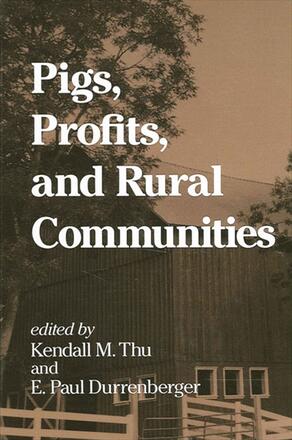
Pigs, Profits, and Rural Communities
Alternative formats available from:
Using the pork production industry as an example, this book illuminates the processes and consequences of agricultural industrialization for the social, economic, human, environmental, and political health of the rural United States.
Description
This book illuminates the processes and consequences of agricultural industrialization, particularly within the swine production industry, for the social, economic, human, environmental, and political health of the rural United States. Contributors come from widely divergent backgrounds including a former U. S. senator, farmers, a veterinarian, a medical psychologist, an agricultural economist, a biological ecologist, a farm organization president, and anthropologists. Set within the theoretical framework of Walter Goldschmidt's research on the community consequences of industrialized food production, these contributions show that the increasing divergence of ownership has real human costs that continue to be ignored by economic developers and policymakers.
Kendall M. Thu is Adjunct Assistant Professor of Anthropology, University of Iowa. E. Paul Durrenberger is Professor of Anthropology, Pennsylvania State University.
Reviews
"…combine[s] hard-hitting analysis with impressive attention to ethnographic detail. [It is] outspoken in [its] concern for contemporary rural life, especially in Iowa. [It includes] fearless voicing of calls for social justice. [It is] important, even crucial. " — H-Net Reviews (H-Rural)
"…this very well reasoned, documented, and deeply reflected upon collection of essays throws down a profoundly grave challenge to America, its changing lifeways, and especially to the massive desire for pig flesh that is met by the meat packing industry in general and the pig business in particular. " — ANTHROZOÖS
"Pigs, Profits, and Rural Communities addresses social impacts accompanying the transition from 'family' farm operated pork production systems to a more vertically integrated industrial model. Current economic and agriculture production literature often focus on the 'efficiencies' of the industrial model and give less attention to the consequences of this change for people, surrounding neighborhoods, and local communities. Pigs, Profits, and Rural Communities gives the reader a view from an alternative perspective. " — Steve Padgitt, Iowa State University
"This book challenges common assumptions of agricultural economics about efficiency and the pursuit of corporate profits, weaving together scholarly discussion, scientific data, and personal accounts of community problems associated with hog farming. The process of rural industrialization is occurring at a pace which is alarming, yet which has received little criticism from state legislators or others who might effectively prevent many of its costs to rural quality of life. It needs the kind of attention we find in this book. " — David Griffith, East Carolina University